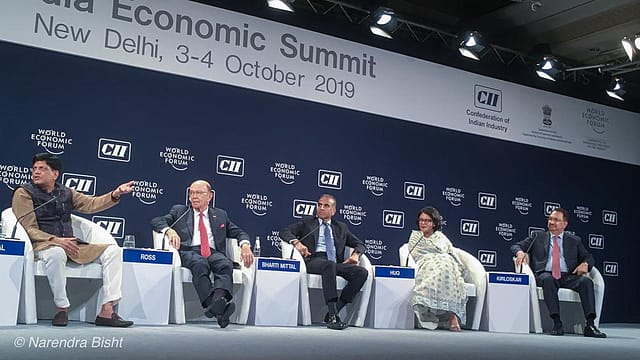India can take advantage of trade dissension elsewhere: Wilbur Ross
ADVERTISEMENT

U.S. secretary of commerce Wilbur Ross said India has an opportunity to take advantage of trade dissension elsewhere, and there was no structural reason as to why India and the U.S. cannot have a trade deal quickly. He added that both countries understood each other’s issues well.
Ross, who was speaking at World Economic Forum’s India Economic Summit (IES) in New Delhi on Thursday, said he would be meeting Union commerce minister Piyush Goyal during his visit. “We have prepared a chart about what are the areas where China is the big exporter to us, how does that compare with what India is exporting to us, and what are possible solutions, how do we change that mixture.”
He also clarified that neither government, India or the U.S., had said that there will be a trade deal in “five minutes”, as was being speculated during Prime Minister Narendra Modi’s recent visit to the U.S.
“Pre-election, there were undoubtedly some constraints… now that the election has come and gone, and PM Modi has a clear, strong position in Parliament, it should be a lot easier to take decisive action,” he said.
Earlier this year, the U.S. terminated India’s designation as a beneficiary developing country under the Generalized System of Preferences (GSP) programme. Under the programme, certain products can enter the U.S. duty-free if beneficiary developing countries meet the eligibility criteria established by the Congress. India, in turn, added fresh tariffs on 28 U.S. products. Trade tensions between the two countries have been simmering since.
Goyal, who was also speaking at the same panel at IES, said the discussions between the U.S. and India were progressing smoothly. He also spoke about the new e-commerce norms which were announced last December. The norms barred e-commerce players from selling products of entities or companies in which they own stakes, and from entering into exclusive deals for products.
The revised e-commerce rules and new requirements for foreign companies to store data locally have hit global firms operating in India.
“The trade deficit arises mainly because of artificial barriers and protectionist barriers that countries have thrown up is the one we are concerned with, that’s the one we are determined to reduce and we think we will make progress there,” Ross said.
Goyal said the government has to consider its domestic political compulsions, and there is no change in India’s stance as far as e-commerce is concerned. The minister added that small retail is a sensitive subject and the government is clear that it will not let it die. "E-commerce is supposed to be an agnostic platform for buyers and sellers, and cannot be allowed to push out small retail...It is not expected to become a platform with predatory prices,” he said, adding that India provides a very stable and predictable regulatory framework.
Secretary Ross said the Indian government had to find a balance between e-commerce and small retailers. He also raised concerns about falling global trade. He said the recent forecast that world trade will be down to 1.2% this year is a bad omen. “Global trade has been growing at a percentage point or so more than the world GDP. If this (global trade growth forecast) is really true, it doesn’t speak very well for the world GDP,” he said.